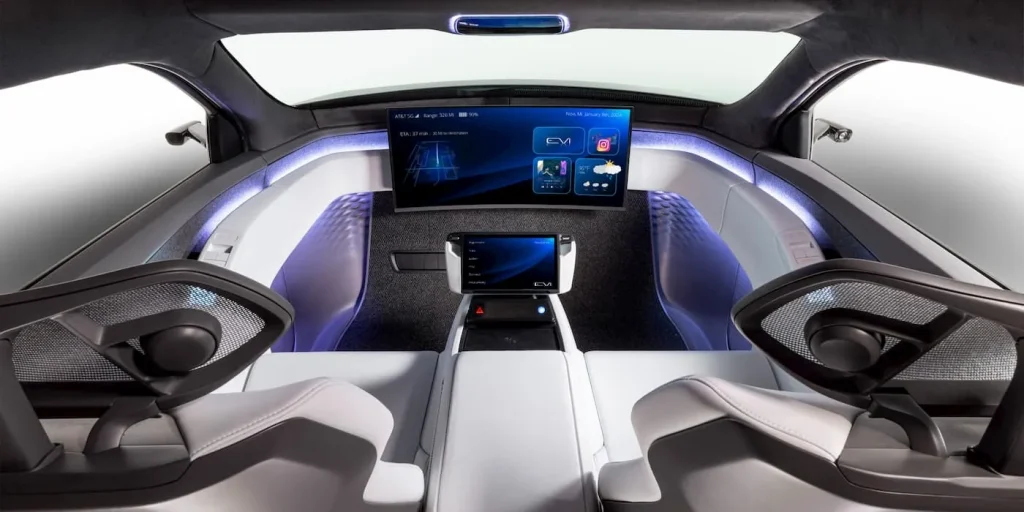 At the 2024 CES, Yanfeng debuted its EVI (Electric Vehicle Interior) concept. This is a vision for future vehicle architecture, that eliminates the traditional instrument panel, and incorporates all key features and interior functions into a Smart Cabin seat, including an active headrest with integrated audio, safety systems, smart surfaces, and storage and charging integrated into the seat.
At the 2024 CES, Yanfeng debuted its EVI (Electric Vehicle Interior) concept. This is a vision for future vehicle architecture, that eliminates the traditional instrument panel, and incorporates all key features and interior functions into a Smart Cabin seat, including an active headrest with integrated audio, safety systems, smart surfaces, and storage and charging integrated into the seat.
Through the development of EVI and the Smart Cabin Seat, Yanfeng’s experts challenged themselves to simplify the vehicle interior while keeping the functionality that users expect. The Yanfeng solution builds them back in a unique way, in an all new module that incorporates both front seats, integrated floor console, steer-by-wire input system, HMI, displays, seatbelts and airbags, in addition to a HVAC microclimate system for thermal comfort.
Research shows three areas of EV owner interest:
Over the years, Yanfeng has conducted multiple studies on electric vehicle interiors. Yanfeng’s research has consistently shown three areas where EV owners (and those interested in EVs) want more. First, end users interested in EVs want access to more technology. They expect an electric vehicle to have more and different/unique technology than an ICE vehicle. Additionally, end users interested in EVs expect smooth and seamless experiences with technology. It needs to work as well, or better, than what they have today and should be used to provide feedback and information to the user that builds trust in the electric vehicle, especially important to first time EV users. Finally, many end users are open to, and looking for EVs to provide a fun and enjoyable experience, something different than in an ICE – technology is something that can help deliver this. Yanfeng’s User Experience Research team also conducted research with end users using an early concept of the EVI demonstrator, bringing in research participants and allowing them to experience the reimagined vehicle interior firsthand. Findings from this research showed end users appreciated the dramatically different layout and interior spaciousness of the EVI concept.
Simplified assembly process:
Not only does EVI offer a new interior space for occupants, it also has the potential to simplify the vehicle assembly process for automotive manufacturers. With all key cockpit components integrated into the Smart Cabin Seat, installation into the vehicle is easier, faster, and less costly than conventional assembly. This is enabled by Yanfeng’s cross-business capabilities, combining knowledge and experience across all its product categories: electronics, safety systems, seating, and interiors.
Sustainability Solutions:
With key vehicle control and interface elements integrated into the Smart Cabin Seat, the need for a traditional Instrument Panel is eliminated. This enables reduced overall vehicle weight and CO2 emissions, as well as increased efficiency, and promotes extended EV range. The ease of installation of the Smart Cabin Seat bodes well for an End-of-Life Vehicle (ELV) strategy as well, making it just as easy for disassembly to boost vehicle circularity efforts. Furthermore, the EVI exemplifies Yanfeng’s commitment to sustainability through careful consideration of chosen materials and manufacturing processes. This includes the use of sustainable, high performing cover stock materials that are combined with Yanfeng’s CHyM substrate panels which use renewable fibers to create a lightweight and circular solution.